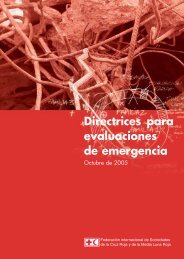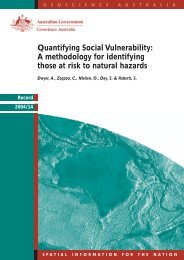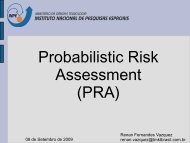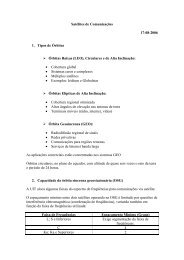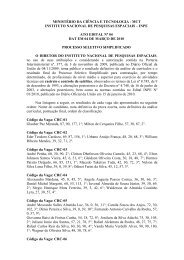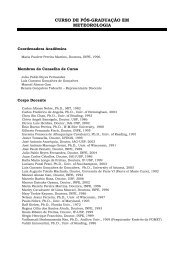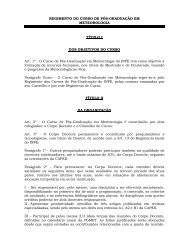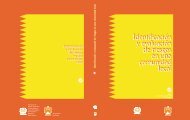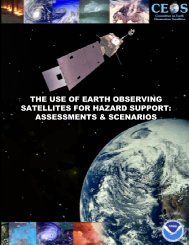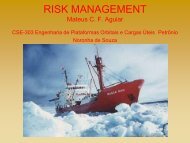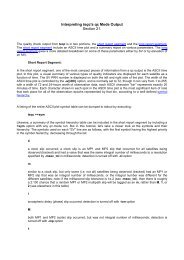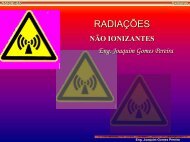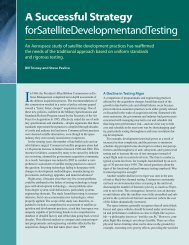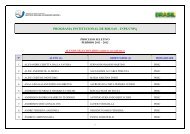Living with Risk. A global review of disaster reduction initiatives
Living with Risk. A global review of disaster reduction initiatives
Living with Risk. A global review of disaster reduction initiatives
Create successful ePaper yourself
Turn your PDF publications into a flip-book with our unique Google optimized e-Paper software.
4<br />
<strong>Living</strong> <strong>with</strong> <strong>Risk</strong>: A <strong>global</strong> <strong>review</strong> <strong>of</strong> <strong>disaster</strong> <strong>reduction</strong> <strong>initiatives</strong><br />
analyses and trend studies. The Munich Re<br />
World Map <strong>of</strong> Natural Hazards has been valued<br />
by <strong>disaster</strong> and risk management pr<strong>of</strong>essionals<br />
since its first publication in 1978. Its subsequent<br />
Globe <strong>of</strong> Natural Hazards most recently updated<br />
in 1998, has also proved to be an effective<br />
information tool. Munich Re regularly produces<br />
additional publications and has recently issued a<br />
CD-ROM, World <strong>of</strong> Natural Disasters, to<br />
advance the public knowledge <strong>of</strong> hazards and<br />
exposure to risk. By employing digital technology<br />
and the benefits <strong>of</strong> GIS representation <strong>of</strong><br />
information, this CD-ROM is easily able to provide<br />
the risk identification and evaluation expertise<br />
<strong>of</strong> the reinsurance industry to engineers, government<br />
<strong>of</strong>ficials and other interested people. It<br />
is able to make a quick assessment <strong>of</strong> the basic<br />
natural hazard potential at any terrestrial position<br />
in the world at the click <strong>of</strong> a button. Additional<br />
information can be found at www.municre.com<br />
Another widely used source <strong>of</strong> public information<br />
and database is the ReliefWeb, operated by<br />
OCHA. Located at www.reliefweb.int, it<br />
focuses primarily on current international<br />
emergencies and <strong>disaster</strong>s <strong>with</strong> humanitarian<br />
implications, although it also provides current<br />
response-oriented information about natural<br />
<strong>disaster</strong>s. ReliefWeb provides an excellent and<br />
wide-ranging selection <strong>of</strong> information, press<br />
accounts, related contacts and operational<br />
information, as well as archived information<br />
drawn from public, governmental, NGO and<br />
authoritative sources about various types <strong>of</strong><br />
emergencies and their consequences. However,<br />
as its name indicates, it largely relates to emergency<br />
preparedness and response interests.<br />
In November 2001, IFRC launched its Disaster<br />
Management Information Systems (DMIS).<br />
This provides a single entry point for relevant<br />
<strong>disaster</strong>-related information and multiple <strong>disaster</strong><br />
management information sources that is<br />
browser-accessible for members <strong>of</strong> the Red<br />
Cross and Red Crescent Movement. Supported<br />
by four National Societies, the United<br />
Kingdom bilateral development agency,<br />
Department for International Development<br />
(DFID) and the commercially sponsored<br />
Ericsson Response Program, the project aims<br />
to provide information about <strong>disaster</strong>s in a systematic<br />
way and to monitor a number <strong>of</strong> factors<br />
that might signal an impending <strong>disaster</strong>. It provides<br />
a toolbox <strong>of</strong> working documents, tem-<br />
Global reports about <strong>disaster</strong>, risk<br />
and vulnerability<br />
World Disasters Report<br />
One <strong>of</strong> the most respected sources <strong>of</strong> information<br />
about <strong>disaster</strong>s is the World Disasters<br />
Report, an annual publication <strong>of</strong> the International<br />
Federation <strong>of</strong> Red Cross and Red Crescent<br />
Societies (IFRC). Published since 1993, the<br />
World Disasters Report provides the latest<br />
trends, facts and analysis <strong>of</strong> the world's<br />
humanitarian crises. Described by the World<br />
Bank as "a very valuable resource for the international<br />
community", the report is an indispensable<br />
reference work for those searching<br />
current information about strategies and tactics<br />
in the face <strong>of</strong> <strong>disaster</strong>. The report is backed<br />
by the resources and expertise <strong>of</strong> IFRC.<br />
The 2002 edition <strong>of</strong> the World Disasters<br />
Report is focusing on risk <strong>reduction</strong> issues.<br />
The report analyses the challenges and opportunities<br />
facing risk <strong>reduction</strong>, and examines<br />
preparedness and mitigation <strong>initiatives</strong> from<br />
<strong>disaster</strong>-prone countries around the globe. In<br />
addition, the report studies the issue <strong>of</strong><br />
humanitarian accountability, presents a<br />
methodology to assess vulnerabilities and<br />
capacities, and concludes <strong>with</strong> <strong>disaster</strong> data<br />
tables that are updated annually. It addresses<br />
such current issues as whether <strong>disaster</strong> preparedness<br />
and mitigation can convincingly be<br />
shown to pay <strong>of</strong>f in terms <strong>of</strong> lives, livelihoods<br />
and assets saved. (www.ifrc.org)<br />
Global Environment Outlook<br />
In line <strong>with</strong> its role in environmental monitoring<br />
and assessment and early warning,<br />
UNEP has launched the Global Environment<br />
Outlook (GEO) series, which contains baseline<br />
information on emerging environmental issues<br />
and threats, as well policies being implemented<br />
at the <strong>global</strong> and regional levels. The findings<br />
and recommendations <strong>of</strong> the GEO<br />
report series constitute the basis <strong>of</strong> UNEP<br />
activities in early warning and vulnerability<br />
and risk assessments.<br />
The GEO-3 report <strong>of</strong> May 2002 specifically<br />
addresses the issue <strong>of</strong> human vulnerability to<br />
158



